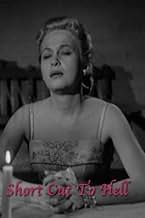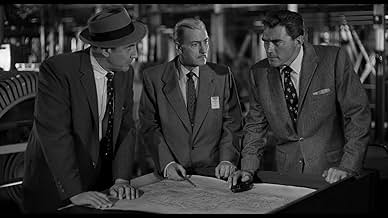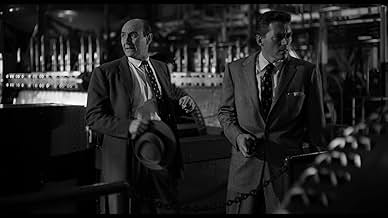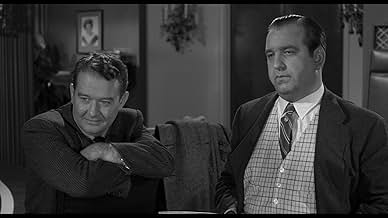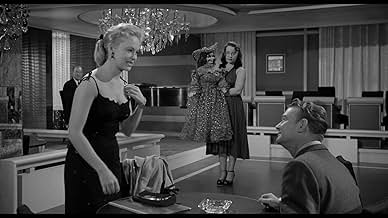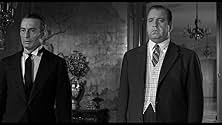अपनी भाषा में प्लॉट जोड़ेंA hired killer's latest contract goes awry when he's paid with stolen money and finds himself embroiled in a deadly cat-and-mouse game with those who hired him.A hired killer's latest contract goes awry when he's paid with stolen money and finds himself embroiled in a deadly cat-and-mouse game with those who hired him.A hired killer's latest contract goes awry when he's paid with stolen money and finds himself embroiled in a deadly cat-and-mouse game with those who hired him.
Larry Arnold
- Commuter
- (बिना क्रेडिट के)
Roscoe Ates
- Road Driver
- (बिना क्रेडिट के)
Joe Bassett
- Patrolman
- (बिना क्रेडिट के)
Jacqueline Beer
- Waitress
- (बिना क्रेडिट के)
Paul Bradley
- Train Passenger
- (बिना क्रेडिट के)
James Cagney
- Self - Pre-credits sequence
- (बिना क्रेडिट के)
Douglas Evans
- Mr. Henry
- (बिना क्रेडिट के)
Joseph Forte
- Ticket Seller
- (बिना क्रेडिट के)
Milton Frome
- LAPD Captain
- (बिना क्रेडिट के)
James Gonzalez
- Train Passenger
- (बिना क्रेडिट के)
फ़ीचर्ड समीक्षाएं
Short Cut to Hell (1957)
A strained effort all around, including James Cagney giving a personal introduction standing next to an imposing movie camera, assuring us his two new leading actors were terrific, before we get a chance to see for ourselves. We can wonder about his motivations, but on the surface two things seem clear. One, he's trying to move from being an actor to being a director (he sort of says he's getting too old to act, interestingly). And two, he's going about it in a cheap and sort of safe way, as if Hollywood knew it wasn't going to go very far.
The result is pretty awful in enough ways to say you might just skip it. I'm a junkie for noir films, and "This Gun for Hire" is a true, early, formative classic from 1942. That one, with Alan Ladd in the lead, and Veronica Lake and Laird Cregar as support, is terrific in all the little ways that add up to something uniquely memorable, even in the hands of little known director Frank Tuttle. Now, fifteen years later, Cagney in his first and last directorial effort, remakes Tuttle's version. He sometimes matches it scene for scene (a few curious substitutions, like an air raid shelter instead of an empty railroad car) and actor for actor (the man taking Cregar's role seems to be vainly imitating him). And he leaves out a few of the key quirks that made the original more, well, original and disturbing (like Ladd's relationship to cats).
One stark difference is the different kind of female character Cagney casts, avoiding the sultry version of Veronica Lake for a very Doris Day kind of lead. And it's probably telling that these terrific new actors Cagney is using had very little in the way of careers after this. Cagney did act in a few more films, living until 1986.
If you have little patience, I think you might not make it through the first painful scene of a woman overacting her weariness in the motel hallway, but that's not fair. It does have faster and more interesting moments. In general, the filming and lighting has brightened up, losing at least the noir visual quality, maybe keeping its tonal range in line for television rebroadcast (an important concern by the late 1950s).
If you want to know the possibilities of the story at its best, start with Graham Greene's 1936 book (A Gun for Sale) and then to the seminal 1942 movie. Short Cut to Hell is an asterisk at beset, a curiosity.
A strained effort all around, including James Cagney giving a personal introduction standing next to an imposing movie camera, assuring us his two new leading actors were terrific, before we get a chance to see for ourselves. We can wonder about his motivations, but on the surface two things seem clear. One, he's trying to move from being an actor to being a director (he sort of says he's getting too old to act, interestingly). And two, he's going about it in a cheap and sort of safe way, as if Hollywood knew it wasn't going to go very far.
The result is pretty awful in enough ways to say you might just skip it. I'm a junkie for noir films, and "This Gun for Hire" is a true, early, formative classic from 1942. That one, with Alan Ladd in the lead, and Veronica Lake and Laird Cregar as support, is terrific in all the little ways that add up to something uniquely memorable, even in the hands of little known director Frank Tuttle. Now, fifteen years later, Cagney in his first and last directorial effort, remakes Tuttle's version. He sometimes matches it scene for scene (a few curious substitutions, like an air raid shelter instead of an empty railroad car) and actor for actor (the man taking Cregar's role seems to be vainly imitating him). And he leaves out a few of the key quirks that made the original more, well, original and disturbing (like Ladd's relationship to cats).
One stark difference is the different kind of female character Cagney casts, avoiding the sultry version of Veronica Lake for a very Doris Day kind of lead. And it's probably telling that these terrific new actors Cagney is using had very little in the way of careers after this. Cagney did act in a few more films, living until 1986.
If you have little patience, I think you might not make it through the first painful scene of a woman overacting her weariness in the motel hallway, but that's not fair. It does have faster and more interesting moments. In general, the filming and lighting has brightened up, losing at least the noir visual quality, maybe keeping its tonal range in line for television rebroadcast (an important concern by the late 1950s).
If you want to know the possibilities of the story at its best, start with Graham Greene's 1936 book (A Gun for Sale) and then to the seminal 1942 movie. Short Cut to Hell is an asterisk at beset, a curiosity.
An icy hit-man seeks revenge after being double-crossed by his employer.
Catch those early scenes with an over-heated Vickers (Daisy). I don't know what director Cagney told her, but she does everything except kiss the camera. Given the generally slack results, I can see why Cagney never again directed. The movie itself is spotty, at best, with an erratic script and uneven acting. Johnson (Glory) and Aubuchon (Barhwell) are fine; however, lead actor Ivers (Kyle) lacks the gravitas to carry off the merciless hit-man. He looks a little like Cagney, but is a long way from the latter's compelling charisma. (Note how the physically slight Ivers wears a bulky trenchcoat in most scenes.) Of the two leads, it's really Georgann Johnson who has the strong presence. Note too, the subtle hints that Bahrwell might well be gay, rather daring innuendo for the time.
Cagney's pretty good at staging. The industrial plant scenes are both eye-catchers and ominously suggestive. And I'm wondering whose lavish Hollywood estate was used for the finale. Speaking of the estate, the showdown is a lot tamer than I expected, given Bahrwell's slimy character. And shouldn't overlook the two execution scenes that are quite graphic, for the time. However, there are also two contrived implausibles—Glory donning Kyle's decoy outfit even though she's certain to get shot; plus, thug Nichols' (Vye) recovering quickly with hardly a mark after a savage beating. Neither is well thought out.
Not surprisingly, Johnson went on to a very respectable TV career, while it looks like Ivers never again had a lead role. Fortunately, Cagney went back to what he did best—acting. All in all, the movie fails to have any lasting impact despite the strong premise. It's definitely not the best version of novelist Greene's This Gun For Hire.
Catch those early scenes with an over-heated Vickers (Daisy). I don't know what director Cagney told her, but she does everything except kiss the camera. Given the generally slack results, I can see why Cagney never again directed. The movie itself is spotty, at best, with an erratic script and uneven acting. Johnson (Glory) and Aubuchon (Barhwell) are fine; however, lead actor Ivers (Kyle) lacks the gravitas to carry off the merciless hit-man. He looks a little like Cagney, but is a long way from the latter's compelling charisma. (Note how the physically slight Ivers wears a bulky trenchcoat in most scenes.) Of the two leads, it's really Georgann Johnson who has the strong presence. Note too, the subtle hints that Bahrwell might well be gay, rather daring innuendo for the time.
Cagney's pretty good at staging. The industrial plant scenes are both eye-catchers and ominously suggestive. And I'm wondering whose lavish Hollywood estate was used for the finale. Speaking of the estate, the showdown is a lot tamer than I expected, given Bahrwell's slimy character. And shouldn't overlook the two execution scenes that are quite graphic, for the time. However, there are also two contrived implausibles—Glory donning Kyle's decoy outfit even though she's certain to get shot; plus, thug Nichols' (Vye) recovering quickly with hardly a mark after a savage beating. Neither is well thought out.
Not surprisingly, Johnson went on to a very respectable TV career, while it looks like Ivers never again had a lead role. Fortunately, Cagney went back to what he did best—acting. All in all, the movie fails to have any lasting impact despite the strong premise. It's definitely not the best version of novelist Greene's This Gun For Hire.
As B movies go, SHORT CUT TO HELL makes it pretty far. This is a tawdrier remake of Graham Greene's source novel for THIS GUN FOR HIRE with lower-rent sets, and lead actors less charismatic, but still very effective. In fact, it's the acting that most impresses about this odd little film. Robert Ivers embodies the diminutive, tightly wound hit-man pretty convincingly; his body language and hard-edged line deliveries are spot-on. Opposite him is Georgann Johnson, who has a disarming, natural acting style. The oil and water combination of these two sustains an interesting tension for the whole movie. Their first meeting aboard a train is a case in point: a very effectively played scene. Talented Johnson never made much of a mark until television later in the 50s and 60s. In the role of Bahrwell, Jacques Aubuchon is very well cast, as are Murvyn Vye and assorted other smaller roles, including Yvette Vickers and Douglas Spencer. Scarce prints of SHORT CUT TO HELL don't always include director James Cagney's spoken introduction and sometimes a jump cut suggests editorial trimming. A restored version of this film would do justice to Cagney's gift for directing actors and a couple of fine action sequences.
This is the only film directed by James Cagney.
In Short Cut to Hell, Robert Ivers plays a hit man paid off with counterfeit money, bringing police to his door. He hops a train to Los Angeles and winds up kidnapping a young woman (Georgian Johnson) who is the girlfriend of a detective (William Bishop).
Very routine and I struggled to stay involved.
Growing up I loved the TV series It's a Great Life which starred Bishop. I suppose if I saw it now I would find it silly, who knows. Sadly he died young.
I had never seen Georgann Johnson as a young and pretty actress. She was a wonderfully talented character actress.
In Short Cut to Hell, Robert Ivers plays a hit man paid off with counterfeit money, bringing police to his door. He hops a train to Los Angeles and winds up kidnapping a young woman (Georgian Johnson) who is the girlfriend of a detective (William Bishop).
Very routine and I struggled to stay involved.
Growing up I loved the TV series It's a Great Life which starred Bishop. I suppose if I saw it now I would find it silly, who knows. Sadly he died young.
I had never seen Georgann Johnson as a young and pretty actress. She was a wonderfully talented character actress.
Towards the end of Short Cut to Hell, with the two principal characters holed up in an abandoned underground storage bunker and the police cars massed outside, there's a long quotation from the doom-freighted score Miklos Rosza wrote for Double Indemnity. It's one of several arresting details the movie provides (another is a newspaper from the previous decade, with the headline 'Allies Cross Siegfried Line'), details that pique interest but go nowhere in attempting to satisfy curiosity.
Short Cut to Hell is an all but forgotten movie but a noteworthy one nonetheless, if only as the only title James Cagney ever directed. Night of the Hunter it's not (the sole directorial effort of Charles Laughton), but another point of engagement is in its being a remake of the 1942 Alan Ladd/Veronica Lake vehicle This Gun for Hire, drawn from the Graham Greene 'entertainment' of that name.
The Ladd/Lake allure didn't last into a new millennium (who knew?), but in 1957 both of them were still reasonably active, their less than glamorous (all right, alcoholic) endgames still a few years, or decades, off. Cagney chose to update them using actors without much in the way of either past or future.
In the Ladd role of the icy, isolated killer-for-hire, Robert Ivers is little more than a trenchcoat and a topper, skin and bones, who brings to mind an unlikely amalgam of Elisha Cook Jr. and James Dean. Finding himself set up through marked bills, after carrying out the two brutal murders contracted by pompous 'fatso' (Jacques Aubuchon, whose indulgences are pretty young things and peppermint patties), he eludes police, taking as hostage Georgann Johnson, a lounge singer engaged to police detective William Bishop.
Johnson proves a game gal, but in the wrong way. She has a way with a wisecrack, but it's not in the flirtatious Veronica Lake way (nor that of Lauren Bacall or Gloria Grahame); the spin she gives is more in the Eve Arden-ish, vinegar-virgin mode, less seductive than matey, even matronly. So the chemistry between captor and captive (our old friend The Stockholm Syndrome) rarely reaches reactive force. (Nor, for that matter, do the reactions between Johnson and Bishop.)
Notwithstanding its unknown cast, Short Cut to Hell doesn't have the look or feel of a B-movie, and Cagney keeps a good pace and an acceptable amount of tension (a few quite brutal scenes help to quicken the pulse as well). It's not quite clear why Cagney chose this material to direct, and he makes (or had to accept) some less than ideal choices, but he'd worked in movies long enough to insure that the movie he directed was brisk and absorbing, a better little movie than its obscurity might suggest.
Short Cut to Hell is an all but forgotten movie but a noteworthy one nonetheless, if only as the only title James Cagney ever directed. Night of the Hunter it's not (the sole directorial effort of Charles Laughton), but another point of engagement is in its being a remake of the 1942 Alan Ladd/Veronica Lake vehicle This Gun for Hire, drawn from the Graham Greene 'entertainment' of that name.
The Ladd/Lake allure didn't last into a new millennium (who knew?), but in 1957 both of them were still reasonably active, their less than glamorous (all right, alcoholic) endgames still a few years, or decades, off. Cagney chose to update them using actors without much in the way of either past or future.
In the Ladd role of the icy, isolated killer-for-hire, Robert Ivers is little more than a trenchcoat and a topper, skin and bones, who brings to mind an unlikely amalgam of Elisha Cook Jr. and James Dean. Finding himself set up through marked bills, after carrying out the two brutal murders contracted by pompous 'fatso' (Jacques Aubuchon, whose indulgences are pretty young things and peppermint patties), he eludes police, taking as hostage Georgann Johnson, a lounge singer engaged to police detective William Bishop.
Johnson proves a game gal, but in the wrong way. She has a way with a wisecrack, but it's not in the flirtatious Veronica Lake way (nor that of Lauren Bacall or Gloria Grahame); the spin she gives is more in the Eve Arden-ish, vinegar-virgin mode, less seductive than matey, even matronly. So the chemistry between captor and captive (our old friend The Stockholm Syndrome) rarely reaches reactive force. (Nor, for that matter, do the reactions between Johnson and Bishop.)
Notwithstanding its unknown cast, Short Cut to Hell doesn't have the look or feel of a B-movie, and Cagney keeps a good pace and an acceptable amount of tension (a few quite brutal scenes help to quicken the pulse as well). It's not quite clear why Cagney chose this material to direct, and he makes (or had to accept) some less than ideal choices, but he'd worked in movies long enough to insure that the movie he directed was brisk and absorbing, a better little movie than its obscurity might suggest.
क्या आपको पता है
- ट्रिवियाJames Cagney's only directorial effort.
- भाव
[Kyle just told Glory that he's a professional killer]
Glory Hamilton: Is there anything you like about yourself?
Kyle: Yeah. I never miss.
- कनेक्शनReferenced in Here's Lucy: Lucy and Carol Burnett (1971)
- साउंडट्रैकI'm in the Mood for Love
(uncredited)
Music by Jimmy McHugh
Lyrics by Dorothy Fields
Performed by Danny Lewis
टॉप पसंद
रेटिंग देने के लिए साइन-इन करें और वैयक्तिकृत सुझावों के लिए वॉचलिस्ट करें
- How long is Short Cut to Hell?Alexa द्वारा संचालित
विवरण
- चलने की अवधि1 घंटा 29 मिनट
- रंग
- पक्ष अनुपात
- 1.85 : 1
इस पेज में योगदान दें
किसी बदलाव का सुझाव दें या अनुपलब्ध कॉन्टेंट जोड़ें


